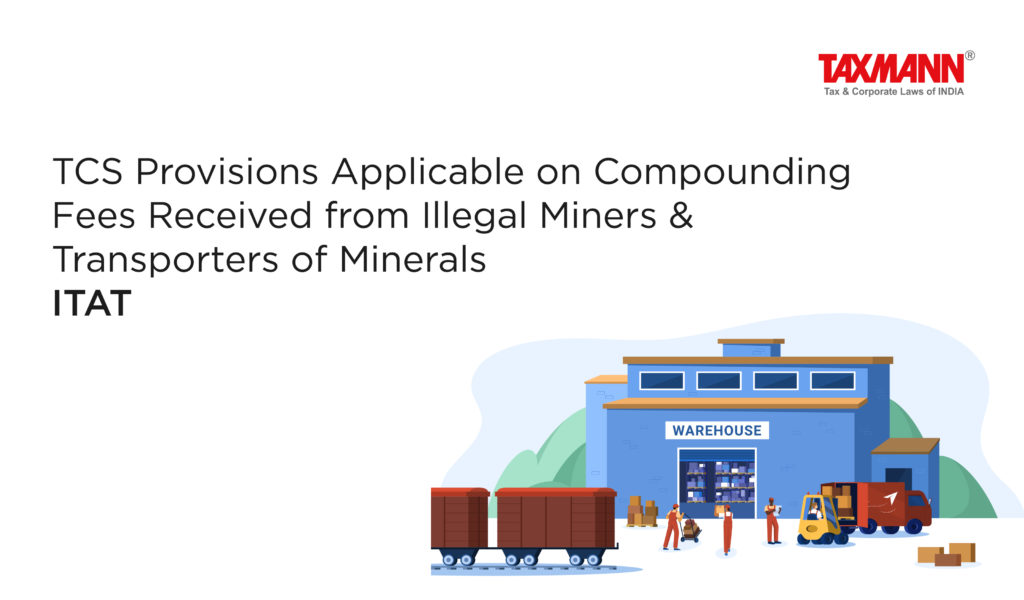TCS Provisions Applicable on Compounding Fees Received from Illegal Miners & Transporters of Minerals | ITAT
- Blog|News|Income Tax|
- 2 Min Read
- By Taxmann
- |
- Last Updated on 27 July, 2023

Case Details: District Mining Officer, Bemtara v. Deputy Commissioner of Income-tax (TDS) - [2023] 152 taxmann.com 583 (Raipur-Trib.)
Judiciary and Counsel Details
-
- Ravish Sood, Judicial Member & Arun Khodpia, Accountant Member
- G.S. Agrawal, CA for the Appellant.
- Choudhary N.C. Roy, Sr. DR for the Respondent.
Facts of the Case
The office of the assessee, i.e. District Mining Officer (DMO), a department of the State Government of Chhattisgarh, was subjected to a TDS survey under section 133A(2A). During the aforesaid proceedings, it was noted that the assessee was not collecting tax at source (TCS) on the amount of compounding fees received from illegal miners and transporters of minerals.
Accordingly, the Assessing Officer (AO) treated the assessee as “assessee-in-default” under section 206C(6). The matter reached the Raipur Tribunal.
ITAT Held
The Tribunal held that section 206C(1C) requires any person who transfers rights or interest in a parking lot, toll plaza, mine, or quarry to another person for business purposes, excluding public sector companies, to collect an amount equal to 2% of the payable amount from the licensee or lessee.
Following strict literal interpretation, the obligation to collect tax at source applies not only to cases with formal lease, license, or contract but also to instances where any transfer of rights or interest, in whole or part, in a mine to another person for business use occurs.
According to the legislative intent, any person who receives a transfer of rights or interest in a mine, whether through a lease, license, contract, or any other means, is considered a “licensee or lessee” under the mentioned statutory provision.
As observed, what is material for triggering the aforesaid statutory provision is whether or not the assessee, i.e., DMO had transferred any right or interest, either in whole or in part in a mine, to another person, for use of the same for business.
The existence of a valid lease or license or contract is not a sine qua non, but rather on construing as per the principle of noscitur a sociis the term “… or otherwise…” used by the legislature in all its wisdom in Section 206C(1C), it can safely be concluded that even in absence of any lease or license or contract, if there is any transfer by the assessee of any such right or interest in the mine, then, the case of the assessee would fall within the meaning of Sec. 206C(1C).
Further, based on the term “transfer”, a careful perusal of the manner of computing and receipt of compounding fees by the assessee from such illegal miners/transporters of minerals reveals that the assessee called upon the illegal miner/transporter of minerals to pay ten times of the amount of royalty in the form of compounding fees.
Assessee received ten times the royalty amount from illegal miners/transporters of minerals, effectively transferring their interest and rights in the mine for the latter’s business use. Therefore, the claim that the assessee would not fall within Section 206C(1C) was liable to be rejected.
Disclaimer: The content/information published on the website is only for general information of the user and shall not be construed as legal advice. While the Taxmann has exercised reasonable efforts to ensure the veracity of information/content published, Taxmann shall be under no liability in any manner whatsoever for incorrect information, if any.

Taxmann Publications has a dedicated in-house Research & Editorial Team. This team consists of a team of Chartered Accountants, Company Secretaries, and Lawyers. This team works under the guidance and supervision of editor-in-chief Mr Rakesh Bhargava.
The Research and Editorial Team is responsible for developing reliable and accurate content for the readers. The team follows the six-sigma approach to achieve the benchmark of zero error in its publications and research platforms. The team ensures that the following publication guidelines are thoroughly followed while developing the content:
- The statutory material is obtained only from the authorized and reliable sources
- All the latest developments in the judicial and legislative fields are covered
- Prepare the analytical write-ups on current, controversial, and important issues to help the readers to understand the concept and its implications
- Every content published by Taxmann is complete, accurate and lucid
- All evidence-based statements are supported with proper reference to Section, Circular No., Notification No. or citations
- The golden rules of grammar, style and consistency are thoroughly followed
- Font and size that’s easy to read and remain consistent across all imprint and digital publications are applied



 CA | CS | CMA
CA | CS | CMA
